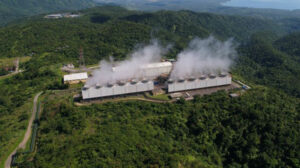THE Philippine Energy Plan in the runup to 2050 will seek to achieve a balance between incorporating affordable renewable energy (RE) while ensuring energy security, the Department of Energy (DoE) said.
“The blueprint for the energy sector… was designed to strike a balance between energy security, affordability, and sustainability,” Undersecretary Mylene C. Capongcol said at an energy forum on Thursday organized by the Economic Journalists Association of the Philippines.
Ms. Capongcol said the DoE has put in place policies that will encourage entry of private-sector investment, while ensuring fair and equal access to the transmission and distribution system.
(The energy transition) will not be cheap… because it involves new and innovative technology like battery energy storage, but eventually, the cost will go down,” Ms. Capongcol said.
The Philippines is targeting a 35% share of RE in the power mix by 2030 and 50% by 2040. The share is currently 22%.
The RE industry’s potential capacity is currently 151.53 gigawatts (GW) after 1,392 project awards.
The transition to cleaner energy faces the so-called “energy trilemma,” requiring it to resolve potential conflicts in achieving energy security, energy equity, and environmental sustainability.
“Our policy is… preparing so that we have this balance (in the power generation mix) to assure our consumers that there is a steady supply,” said Francis Saturnino C. Juan, chairman and chief executive officer of the Energy Regulatory Commission (ERC).
Republic Act No. 9136 or the Electric Power Industry Reform Act of 2001 tasks the ERC with promoting competition, encouraging market development, and ensuring greater consumer choice in the electric power industry.
“Conversely, aggressively pursuing renewable energy supports sustainability but may increase costs if not carefully managed. This encapsulates the essence of the trilemma, a challenge we must all confront collectively,” Mr. Juan said.
He said that the “new ERC” aims to be “more responsive, forward-thinking, and decisive” in fulfilling its mandate.
Allan Barcena, assistant vice-president of Energy Development Corp. (EDC), said the company is pushing to boost the capacity of its power plants, particularly those running on geothermal energy.
“We are trying to improve our power plants to not only ensure adequate capacity but a highly reliable capacity at any given time,” Mr. Barcena said.
Geothermal energy, a form of baseload power supply, stands out as “the most reliable renewable resource in addressing all three dimensions simultaneously,” he said.
EDC, a subsidiary of First Gen Corp., operates 1,480.19 megawatts of capacity, equivalent to around 20% of the Philippines’ installed RE capacity.
“The energy trilemma requires solutions that do not compromise one goal for another. Geothermal energy uniquely satisfies this challenge by providing secure, affordable, and sustainable power,” Mr. Barcena said. — Sheldeen Joy Talavera
